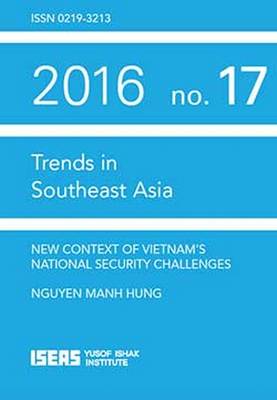Trends in Southeast Asia
2 total works
Vietnam’s concept of national security is based on “the survival of the ruling regime that acts in the name of the country”. This is unlike in many countries where national security relates merely to the survival of the state.
Because the challenges to Vietnam’s national security are perceived as challenges and threats to the ruling regime, the concept of national security tends to focus on the internal dimension of national security.
The Mid-term National Congress of the Communist Party of Vietnam (CPV) in 1994 listed “four threats” facing the country, namely, the danger of falling behind neighbouring countries economically; the threat of “peaceful evolution”; deviation from socialism; and corruption and bureaucratism. None of them, except for peaceful evolution, comes from outside.
Today, these threats remain but are now joined by the threat of “self-evolution” or “self-transformation” leading to socialist deviation and peaceful evolution, as well as the threat to national sovereignty and territorial integrity resulting from the conflict in the South China Sea.
Consequently, the military is tasked not only with the mission of protecting the fatherland but also protecting “the party, state, people and the socialist regime”.
The Twelfth National Congress of the CPV in 2016 attempted to re-establish the control of the party over the state; to launch a renewed effort to combat corruption and purge the party of those who exhibited signs of degeneration in morality, political thinking and lifestyle; and earn the people’s trust.
Today, China is the only external threat to Vietnam’s sovereignty and territorial integrity, and the focal point of that threat is the South China Sea.
Vietnam has responded to this threat with a three-point policy: accommodating China’s security interests; building up self-defence capability; and mobilizing international support.
The strategy to mobilize international support is based on three elements: reliance on diplomacy and international law; mobilizing international support through integration in the regional and international system and a policy of “openness, multilateralization and diversification of foreign relations”; and soft balancing between the major powers.
Recent serious challenges to Vietnam’s national security policy include: the unpredictable politics of the United States over ratification of the TPP and uncertainty over its “pivot” to Asia strategy; President Rodrigo Duterte’s tilt towards China, his country’s “separation” from the United States, and the uncertain future of the U.S.-Philippines military alliance; China’s strong reaction to the July ruling of the Permanent Court of Arbitration in favour of the Philippines, and a divided and weakened ASEAN.
Because the challenges to Vietnam’s national security are perceived as challenges and threats to the ruling regime, the concept of national security tends to focus on the internal dimension of national security.
The Mid-term National Congress of the Communist Party of Vietnam (CPV) in 1994 listed “four threats” facing the country, namely, the danger of falling behind neighbouring countries economically; the threat of “peaceful evolution”; deviation from socialism; and corruption and bureaucratism. None of them, except for peaceful evolution, comes from outside.
Today, these threats remain but are now joined by the threat of “self-evolution” or “self-transformation” leading to socialist deviation and peaceful evolution, as well as the threat to national sovereignty and territorial integrity resulting from the conflict in the South China Sea.
Consequently, the military is tasked not only with the mission of protecting the fatherland but also protecting “the party, state, people and the socialist regime”.
The Twelfth National Congress of the CPV in 2016 attempted to re-establish the control of the party over the state; to launch a renewed effort to combat corruption and purge the party of those who exhibited signs of degeneration in morality, political thinking and lifestyle; and earn the people’s trust.
Today, China is the only external threat to Vietnam’s sovereignty and territorial integrity, and the focal point of that threat is the South China Sea.
Vietnam has responded to this threat with a three-point policy: accommodating China’s security interests; building up self-defence capability; and mobilizing international support.
The strategy to mobilize international support is based on three elements: reliance on diplomacy and international law; mobilizing international support through integration in the regional and international system and a policy of “openness, multilateralization and diversification of foreign relations”; and soft balancing between the major powers.
Recent serious challenges to Vietnam’s national security policy include: the unpredictable politics of the United States over ratification of the TPP and uncertainty over its “pivot” to Asia strategy; President Rodrigo Duterte’s tilt towards China, his country’s “separation” from the United States, and the uncertain future of the U.S.-Philippines military alliance; China’s strong reaction to the July ruling of the Permanent Court of Arbitration in favour of the Philippines, and a divided and weakened ASEAN.
The Politics of the United States-China-Vietnam Triangle in the 21st Century
by Nguyen Manh Hung
Published 30 December 2015
Vietnam's balancing of power act, namely the policy of seeking a counterweight to the China threat, and the politics of the U.S.-Vietnam-China triangle, may have taken shape in the early years of the twenty- ?first century, but it was deeply rooted in the changing relations between the big powers in the 1980s and Vietnam's need to adjust its policy to these changes. A combination of factors - geographical proximity, ideological affinity, and the need for regime survival - tends to make Vietnamese leaders more comfortable with China than with the United States. Only the perception of China as a bullying neighbour would push Vietnam to opt for a different orientation and adopt an antagonistic policy towards China. Meanwhile, United States-Vietnam relations in turn are affected by two factors: Vietnam's sensitivity to China's concerns and its mistrust of U.S. intentions. Bilateral relations became warmer mainly after Vietnam took steps to overcome its mistrust of the United States. China's recent assertive behaviour in the South China Sea worries Vietnam and threatens the U.S. position in the Asia- ?Pacific, and this has led to a convergence of strategic interests between the United States and Vietnam.

